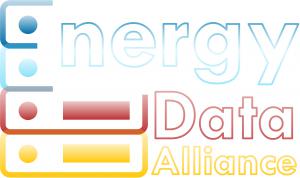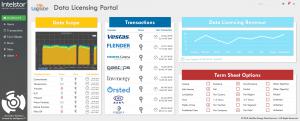Renewable Energy Companies Leaving Millions in Unclaimed Royalty Income on the Table by not Licensing Data
Data owners who out-license or cross-license their data could collectively see a total royalty income upwards of US$673 million in the US alone.
HOUSTON, TEXAS, UNITED STATES OF AMERICA, January 20, 2019 /EINPresswire.com/ -- Digital content aggregation and data licensing is a well-established business practice for digitally delivered services in other industries. Just like a Hollywood movie studio develops a new blockbuster and licenses it to movie theaters, television broadcasters, and other online digital media platforms like Netflix, Hulu, Amazon Prime, etc., there is a need for a Netflix of energy data in order to provide companies with a commercial incentive to share their content.With the advent of digital transformation in renewable energy, this industry has an opportunity in front of it to share more of the data which companies have amassed on asset performance and health monitoring. There are already several digital service platform providers, a plethora of asset owners, as well as data analytics companies who will create more digital content in 2019 than in the rest of the industry’s history combined.
This comes in the form of asset performance reports which analyze SCADA and CMS data, and could even combine other data like end of warranty inspection reports, borescope images for a gearbox, blade leading edge erosion monitoring, bearing lubricant quality and more.
These companies will be generating digital content and data that has both direct value for asset performance management or asset health monitoring, as well as indirect value in terms of competitive and market intelligence, such (i.e. identification of component failures, technology usage inside the wind turbine, component pricing data, etc.).
Proactive asset owners, OEMs, or insurance brokers with reams of asset reliability and performance data who out-license or cross-license their data could collectively see a total royalty income upwards of US$673 million in recognized commercial value for the data they own or control in the United States market alone.
This underscores the need for a data and digital content exchange to facilitate such licensing transactions. Enter the Energy Data Alliance, a group of companies who have agreed to pool data and cross-license it with each other. Comprised of OEMs, asset owners and data analytics providers, this platform creates a standardized process for data rich companies to share data and generate royalty income.
In the past, asset owners, OEMs or independent service providers had no commercial incentive to share their data with other companies. This resulted in most companies stockpiling a significant amount of SCADA, CMS and other data while being highly reluctant to share it for fear of liability exposure on warranty claims.
However, most companies would likely share more of their data if they were offered a royalty for licensing it, instead of just giving it away to a data pool. Nevertheless, most of these content-generating companies will not consider the monetization of this indirect value related to market intelligence as a core business for them.
As with the adoption of digital content aggregation and data licensing in other industries, what is required for this data-as-a-service (DaaS) business model to function in renewable energy is an online marketplace for asset health monitoring and asset performance data.
The companies who have data to share can anonymously list the data fields they have to license, and potentially a small sample of their data. Interested buyers / licensees would evaluate the content and indicate if they were willing to accept the commercial terms related to the license, such as duration, exclusivity, jurisdiction of the license, prohibited uses, etc.
Once the license transaction is agreed upon, and the licensee provides payment, the content owners share their data through their own application programming interface (API) or some other information sharing mechanism. Companies can even offset their cost of in-licensing data which they require to build digital models / twins if they share some of their own data.
Content owners retain all rights, title, and maintain data security / integrity themselves on their own servers until the transfer of a copy of their data. All transferred content can be digitally tagged and the usage can be tracked by using blockchain / digital ledger technology in order to ensure proper use and license term compliance.
Asset owners and other data contributors can retain the right to refuse to license at their discretion by utilizing a rules engine. That means asset owners, OEMs, and component suppliers who contribute data will only license what they want & to whom they want.
This package of information can then be used to identify sales opportunities for aftermarket components, fleetwide servicing issues, or even performance upgrade opportunities which asset owners did not know existed.
Most asset performance and health monitoring data is highly fragmented due to distributed asset ownership of turbine models from a single OEM amongst multiple asset owners and operators. This business model would allow data analytics companies or the services divisions of OEMs to pool data from several asset owners or even the asset owners plus other OEMs in order to get a complete picture.
Content licensing is an enabler for multi-brand services, since OEMs who want to perform service on competitor branded assets will require the SCADA, CMS and other data from the asset owner to build the digital asset profile / twin.
In the emerging field of digital services, companies who generate data and companies who want access to it need to employ a content licensing business model in order to recognize the full value of their products and services.
Content monetization opportunities exist for asset owners, and even insurance companies. They are likely to see commercial benefit from partnerships with analytics companies, asset performance management companies, asset health monitoring companies, and energy trading / balancing companies who are all data thirsty at the moment. The asset performance data can be sold or traded for services or other commercial rights, as companies with data attempt to balance the negotiating field in service agreements with companies that have a strong IP position.
While we may be less mature in renewable energy when it comes to monetizing data, we certainly have significant upside potential that data owners should not let go to waste. Companies can monetize both direct and indirect value from their data.
Philip Totaro
IntelStor
+1 213-465-0080
email us here
Visit us on social media:
Facebook
Twitter
Google+
LinkedIn
Legal Disclaimer:
EIN Presswire provides this news content "as is" without warranty of any kind. We do not accept any responsibility or liability for the accuracy, content, images, videos, licenses, completeness, legality, or reliability of the information contained in this article. If you have any complaints or copyright issues related to this article, kindly contact the author above.



